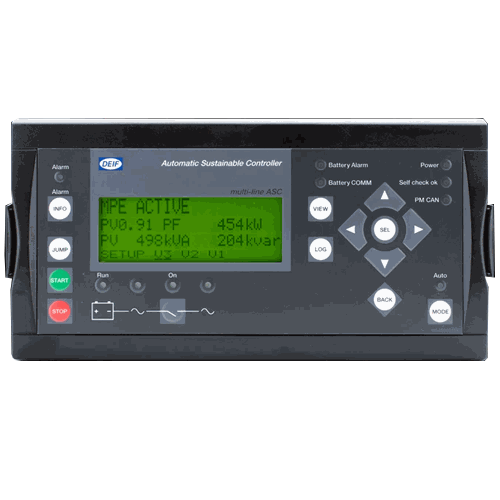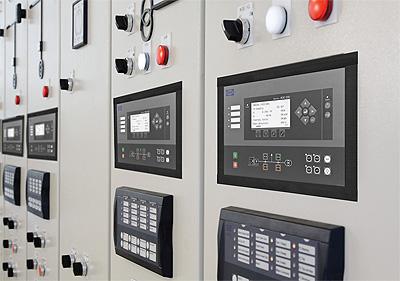Products: DEIF ASC-4 Battery

DEIF ASC-4 Battery
A Simplified Solution For Genset Builders.
The DEIF ASC-4 Battery is a highly configurable sustainable energy storage controller that allows seamless integration of an ESS in greenfield applications with other DEIF controllers such as the AGC-4 Mk II advanced genset controller and other sustainable controllers in our ASC-4 range.
Wide range of control strategies
The ASC-4 Battery lets you store and use green power from PV panels and wind turbines. The controller handles charging and discharging as required by the operating scenario, based on state of charge control of the ESS or using Schedular-Command timers that allow you to define which sources to charge from, and when. It includes control strategies such as peak shaving, load take-over, fixed power, automatic mains failure (AMF), and mains power export (MPE), allowing it to be used for a wide range of applications. You can define and change the priority of connected power sources.
Energy source, power source, or droop mode
The
ASC-4 Battery is suitable for grid-forming or grid-following
applications, and it supports energy source or power source functions.
It is also able to run in droop mode (acting as a virtual synchronous
generator) if the ESS supports this. The ASC-4 Battery can switch
operating modes very quickly as required. It supports grid/power quality
support with active or reactive power, spinning reserve capability
(reducing the number of gensets running), frequency and load response,
and load control.
Built-in power metering
The
built-in power metering feature of the ASC-4 Battery measures busbar
voltage, current, and frequency before and after the breakers. Operation
and mode switches can be configured to be based on these readings, for
example carrying out mode switches based on voltage and frequency
changes.
Full compatibility with wide range of equipment
The
ASC-4 Battery can communicate with a BCU (battery control unit) or
directly with a BMS (battery management system) and PCS (power control
system) over Modbus, allowing it to be used with a wide range of ESSes.
It is designed for full compatibility with DEIF controllers, allowing
you to set up an EMS quickly and efficiently. For an updated
compatibility list for the controller, see Application Notes on the
Documentation tab.
M-Logic provides flexibility and customisability
The
setup of the ASC-4 Battery can quickly and easily be reconfigured as
needed using the user-friendly M-Logic tool (part of DEIF’s free PC
utility software offering). This allows the controller to be customised
to a wide range of local applications.
Emulation feature provides safe system testing
The
built-in emulation feature of the ASC-4 Battery enables you to interact
with the controller in a controlled and safe environment without
risking to damage any equipment. All you need to do to perform a
complete test of your system is to turn on your controller and connect
communications.
Product Overview
Refer to the table below
Key Features
-
Modes for operation:
Automatic
-
Manual
-
Remote Stop & Start
-
-
Applications:
Grid Support
-
Power Management Applications
-
Solar/Plant Integration
-
-
Inputs:
4 Digital inputs
-
-
Outputs:
2 Digital Outputs
-
5 Relay Outputs
-
-
Communication:
Modbus TCP/IP
-
Modbus RS-485
Key Features Continued.........
-
Measurements:
1-Φ/3-Φ voltage
-
Frequency
-
Current 3-Φ
-
P/F for generator and mains
-
-
Functionality:
Multi-Master System
-
Plant Control (Up to 16 DG)
-
Integrated with Sunspec Compliant Inverters
-
-
Monitoring:
State of Charge
-
Grid Following/Forming
-
BMS Communication
-
PCS/BCU/PDS Communication
-
-
Programming:
From Display
-
With Utility Software (USW3)
-
-
Remote Monitoring
ASC-4 Battery Hardware Options
Overview
Battery
-
Standard Options
-
J1
-
H2
-
Display
Experience DEIF
Experience ultimate control. iE250
Start with the customer – find out what they want and give it to them.
Designed with you in mind
Support - Sales and After Market

Spare Parts & Technical Support
Please click on the link below for spare parts service and maintenance
